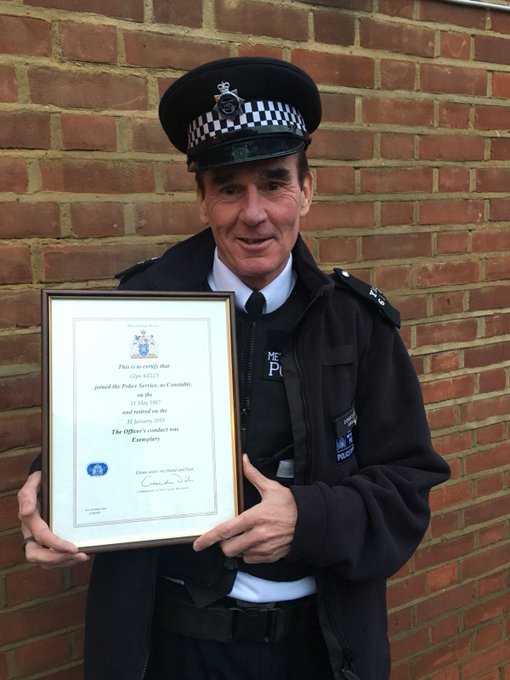
Reports of the death of neighbourhood policing may have been greatly exaggerated, but earlier this week they came one step closer to being realised. PC 617YR Glyn Kelly died last Monday, eighteen months after retiring from the Metropolitan Police. For most of his 31 years of service he dedicated himself to one thing only, keeping the people of Harringay Ward, in north London safe. Every shift he could be seen patrolling down Green Lanes or around Finsbury Park in his beat helmet and faded stab vest with its bulging pockets. He travelled very slowly because of the numbers of people who stopped him to report crime, give him a juicy piece of intelligence or merely share a joke. Had he not been a champion runner the amount of tea and biscuits he consumed on the beat would have cost the Met a fortune in stab vests.
PC Kelly was one of the last of the true beat cops. Serving more than 20 years in the same council ward meant that he knew everyone and everything. He was able to identify trouble almost before it happened and knew where the next hotspot would be long before it became a blob on a map. His crime prevention rate – if such a thing could have been measured – would have been astounding. He instinctively grasped the kernel of truth behind the broken windows theory, helping plant trees on troubled streets and persuading people to take pride in their area. He was a regular visitor at church fairs and school fetes, though he drew the line at wearing the Santa costume. He was equally welcome in the mosque, the Greek Orthodox church, the United Reform church and the Anglican church. Stationed outside the mosque after each terror attack during the spring and summer of 2017 he was overwhelmed with bottles of water and kind words from worshippers glad that “their bobby on the beat” was keeping them safe.
Most importantly he encouraged the public to take an active role in maintaining their own safety by founding the Ladder Community Safety Partnership. This meets once a month to discuss everything from dog waste to the latest drug den and attracts more people than the formal ward panel ever did. The LCSP emerged in the noughties out of a successful community effort to tackle the Turkish night cafes on Green Lanes that were a cover for a booming heroin trade. Green Lanes still attracts people from all over London, but now they come for the excellent Turkish food. PC Kelly worked hard to oppose the licencing of any late night venues so there was no chance the night cafes could emerge again.
I was 27 when I joined the police, the same age as PC Kelly when he left his native Newcastle to join the Met. I had come with ideas of making a difference in a ‘hard-to-reach community’ but I found out that all the tough work had already been done. All there was for me to do was to learn from the expert how to be a neighbourhood police officer. I’m not sure what PC Kelly made of the naïve young Cambridge graduate he was suddenly lumbered with, but he made it his mission to teach me everything he knew and in the process became almost a surrogate father. Over the year and a half we patrolled side by side, I never heard him raise his voice or act in anger. He treated everyone with the same courtesy and respect, no matter if they were burglary victims or begging on the street. His arrest figures might have been low but the trust the community had in him was beyond measure. I raised that arrest rate considerably as he did his best to ensure this keen young probationer didn’t get into too much trouble. I knew that whatever happened he would have my back and would let me take the lead in operations to tackle drug dealing and rough sleeping – while always being on hand to give me help and guidance.
PCSO Lisa Yianni who served 14 years with PC Kelly, expressed her sadness at his passing in verse: “You were a bobby on the beat, In Harringay on every street, To work with you it was a pleasure, Fourteen years that I will treasure, You dedicated thirty one years, To fight crime despite the fears, Side by side we walked each day, I never heard you complain, Worn out boots you had a pile, You must have walked a million miles, And now you’re gone and memories remain, A dedicated bobby it’s such a shame.”
PC Kelly sought no credit for what he did and did not seek promotion, although he collected enough evidence to launch several successful careers. He did however once appear in the Independent, guarding a space ship that had “crash landed” into one of the primary schools. He told me once that as soon as he arrived in Harringay ward he realised he had found his place and did not want to go anywhere else.
He died on Monday August 19, at the age of 59, just a few months after being diagnosed with oesophageal cancer. He smoked like a chimney and was regularly seeing patrolling the grim alleys off Green Lanes so he could check for drug dealers and have a fag at the same time. But this was his way of coping with the stresses of the job; a job to which he gave his life.
The tragic death of PC Andrew Harper reminded the nation of the ultimate sacrifice some officers make in the line of duty. Yet the quiet sacrifice of officers like PC Kelly, who succumb to the gradual attrition of stress, shift work and routine exposure to trauma, also need to be acknowledged.
Unsung local bobbies like PC Kelly are becoming rarer now in police forces where strains on budgets and a move towards prioritising threat, risk and harm mean neighbourhood policing is gone in all but name. But cops like him keep the thin blue line strong and maintain that balance of trust between the people and police which is so vital.
Prime Minister Boris Johnson has pledged to recruit 20,000 new police officers, many of whom are expected to go into neighbourhood policing, because the public has asked for a return of a visible presence on the streets. If even a few of them are enabled to make the same impact on their communities that PC Kelly did in Harringay, we may see his like again.
